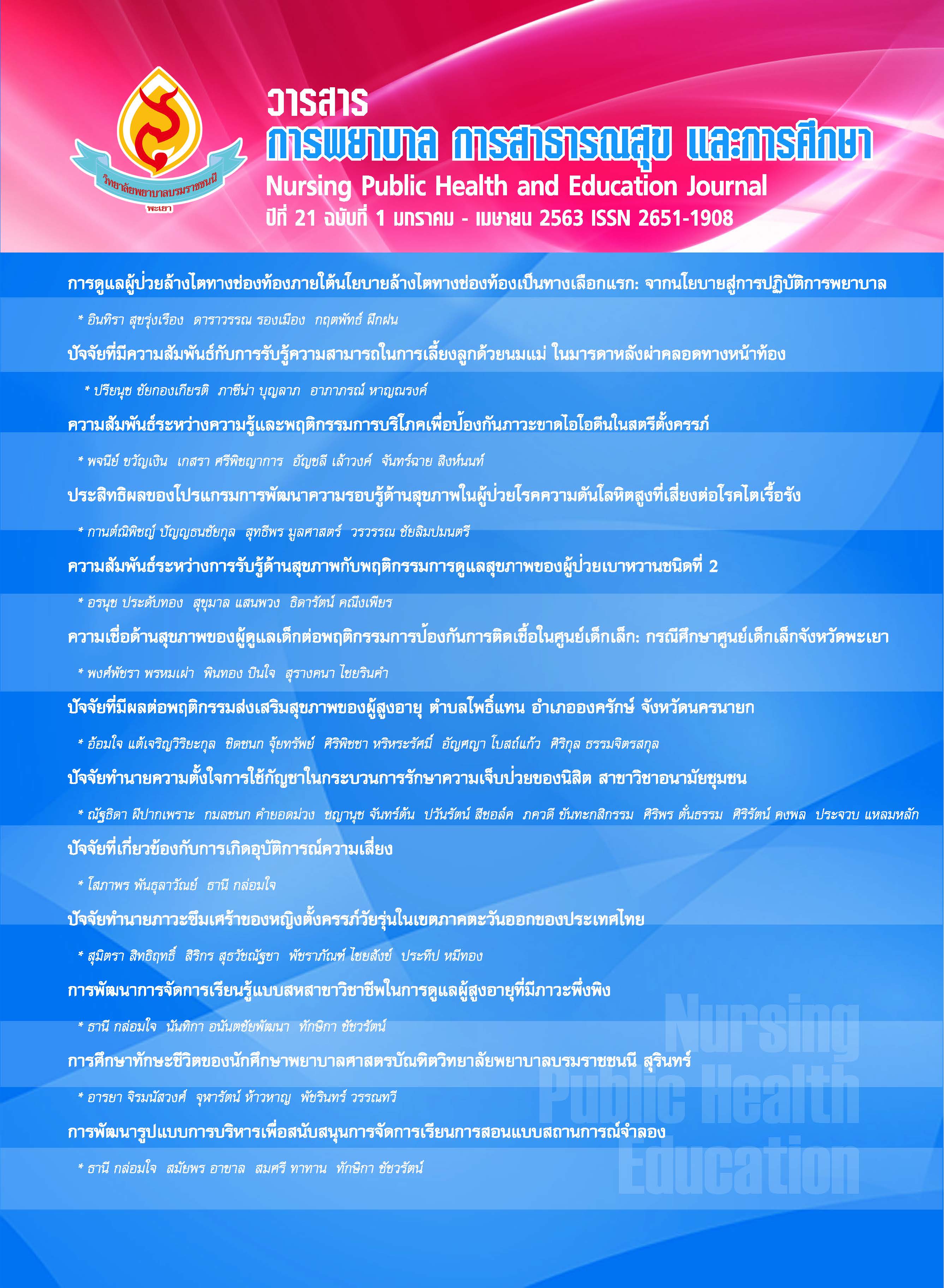ความสัมพันธ์ระหว่างความรู้และพฤติกรรมการบริโภค เพื่อป้องกันภาวะขาดไอโอดีนในสตรีตั้งครรภ์
คำสำคัญ:
สตรีตั้งครรภ์, ความรู้, พฤติกรรมการบริโภคไอโอดีนบทคัดย่อ
การได้รับไอโอดีนไม่เพียงพอกับความต้องการของร่างกายในระยะตั้งครรภ์ ส่งผลให้ทารกในครรภ์มีพัฒนาการของสมองและระบบประสาทช้ากว่าปกติ แท้ง และพิการแต่กำเนิด การวิจัยเชิงพรรณนาครั้งนี้มีวัตถุประสงค์เพื่อสำรวจความรู้และพฤติกรรมการบริโภคเพื่อป้องกันภาวะขาดไอโอดีนในสตรีตั้งครรภ์ และหาความสัมพันธ์ระหว่างความรู้และพฤติกรรมการบริโภคเพื่อป้องกันภาวะขาดไอโอดีนในสตรีตั้งครรภ์ กลุ่มตัวอย่างเป็นสตรีตั้งครรภ์ปกติจำนวน 233 คน ดำเนินการเก็บรวบรวมข้อมูลภายหลังจากผ่านความเห็นชอบจากคณะกรรมการจริยธรรมการวิจัยคณะพยาบาลศาสตร์ และโรงพยาบาลส่งเสริมสุขภาพศูนย์อนามัยที่ 1 จังหวัดเชียงใหม่ เครื่องมือวิจัยในครั้งนี้เป็นแบบวัดความรู้และพฤติกรรมการบริโภคเพื่อป้องกันภาวะขาดไอโอดีน ซึ่งปรับจากแบบวัดความรู้และพฤติกรรมของเกสรา ศรีพิชญาการและคณะ (2552) และผ่านการตรวจสอบคุณภาพมีค่าความเที่ยงตรงเชิงเนื้อหาหรือค่าดัชนีความสอดคล้องระหว่างข้อคำถามและวัตถุประสงค์ เท่ากับ 0.67-1.0 และความเชื่อมั่นในระดับที่ยอมรับได้ของแบบวัดความรู้เรื่องไอโอดีนและพฤติกรรมการบริโภคเพื่อป้องกันภาวะขาดไอโอดีน เท่ากับ 0.79 และ 0.67 ตามลำดับ วิเคราะห์ข้อมูลและหาความสัมพันธ์โดยใช้สถิติเชิงพรรณนาและสถิติสัมประสิทธิ์สหสัมพันธ์แบบสเปียร์แมน ผลการศึกษาพบว่า กลุ่มตัวอย่างร้อยละ 78.97 มีคะแนนความรู้เรื่องไอโอดีนอยู่ในระดับต่ำ และร้อยละ 21.03 มีคะแนนความรู้อยู่ในระดับปานกลาง ส่วนพฤติกรรมการบริโภคเพื่อป้องกันภาวะขาดไอโอดีน กลุ่มตัวอย่างร้อยละ 48.93 มีพฤติกรรมอยู่ในระดับต่ำ ร้อยละ 46.35 มีพฤติกรรมอยู่ในระดับปานกลาง และร้อยละ 4.72 มีพฤติกรรมอยู่ในระดับสูงตามลำดับ และพบว่าคะแนนความรู้มีความสัมพันธ์ทางบวกในระดับปานกลางกับพฤติกรรมการบริโภคอย่างมีนัยสำคัญทางสถิติ (p<.001, rs = 0.40)จากผลการศึกษาครั้งนี้แสดงให้เห็นว่า กลุ่มตัวอย่างยังมีความรู้และพฤติกรรมการบริโภคเพื่อป้องกันภาวะขาดไอโอดีนอยู่ในระดับต่ำ ดังนั้นควรมีการรณรงค์ให้สตรีตั้งครรภ์มีความรู้เกี่ยวกับการป้องกันภาวะขาดไอโอดีนเพื่อเป็นพื้นฐานในการปรับเปลี่ยนพฤติกรรมการบริโภคไอโอดีนที่เหมาะสมต่อไป
เอกสารอ้างอิง
เกสรา ศรีพิชญาการ, พิมพาภรณ์ กลั่นกลิ่น, นิตยา ไทยาภิรมย์, และมาลี เอื้ออำนวย. (2552). ความรู้ความเชื่อ และการปฏิบัติเกี่ยวกับการบริโภคสารไอโอดีนของบุคคลในคณะพยาบาลศาสตร์ มหาวิทยาลัยเชียงใหม่. วารสารสาธารณสุขศาสตร์, 39(1), 20-33.
กรมสุขภาพจิต. (2559). เด็กไทยมีไอคิวต่ำจริงหรือ. สืบค้นเมื่อ 13 มีนาคม 2563, จาก https://www.dmh.go.th/news/view.asp?id=2273
กรมอนามัยสำนักโภชนาการ กระทรวงสาธารณสุข. (2559). เอกสารเผยแพร่สื่อมีเดีย. โครงการควบคุมและป้องกันโรคขาดสารไอโอดีน. รายงานการประชุมประจำปีของกระทรวงสาธารณสุข พ.ศ. 2561. สืบค้นเมื่อ 13 มีนาคม 2563, จากhttp://nutrition.anamai.moph.go.th/ewtadmin/ewt/nutrition/main.php?filename=iodine
ปราโมทย์ มาตย์สุริย์. (2555). การป้องกันโรคขาดสารไอโอดีนของหญิงตั้งครรภ์ในอำเภอน้ำโสม จังหวัดอุดรธานี ปี 2554. สำนักงานป้องกันควบคุมโรคที่ 6 ขอนแก่น, 19(2), 27-40.
ภัสพร สมภาร, มานพ คณะโต, และภัสสร์วัลย์ รังสิปราการ. (2556). พฤติกรรมป้องกันภาวะขาดสารไอโอดีนของหญิงตั้งครรภ์กับระดับฮอร์โมนกระตุ้นต่อมไทรอยด์ของทารกแรกเกิดในอำเภอนาวังและอำเภอนากลาง จังหวัดหนองบัวลำภู.วารสารการพัฒนาสุขภาพชุมชน มหาวิทยาลัยขอนแก่น, 1(3), 117-130.
ศูนย์บริการสาธารณสุข สำนักอนามัย, กรุงเทพมหานคร. (2015). โรคขาดสารไอโอดีน. สืบค้นเมื่อ 13 มีนาคม 2563, จาก http://www.bangkok.go.th/healthcenter29/page/main/2967/title/0/info/95089/
สุภาภัค สิงห์เสนา และเบญจา มุกตพันธุ. (2558). ปัจจัยที่มีผลต่อปริมาณไอโอดีนในปัสสาวะของหญิงตั้งครรภ์ที่มาฝากครรภ์. วารสารโรงพยาบาลมหาสารคาม, 12(3), 161-172.
Becker, M.H., &Maiman, L.A. (1974). The health belief model: Origins and correlation in psychological theory. Health Education Monograph., 2(4): 336-353.
Bloom, B. S. (1968). Learning for mastery. Instruction and curriculum. Regional education laboratory for the Carolinas and Virginia, Topical papers and reprints, Number 1. Eval Comment 1(2), 1–11.
El-mani, S. F. (2013). Knowledge, behaviour and practices of pregnant women in Wollongong regarding folic acid and iodine nutrition after the introduction of a mandatory fortification program. (Master of Science - Research thesis, Faculty of Health and Behavioural Sciences). Wollongong. University of Wollongong. Retrieved June 30, 2018, from http://ro.uow.edu.au/theses/4112.
Sripichyakan, K., Urharmnuay, M., Klunklin, P., &Woragidpoonpol, P. (2008). Preliminary analysis of knowledge, belief, and practice of families, health-related personnel, and local authorities on elimination of iodine deficiency disorders. Faculty of NursingChiang Mai University. (n.p.).
WHO/UNICEF/ICCIDD. (2008). Assessment of iodine deficiency disorders and monitoring limination. 3rd ed. Geneva: WHO. Retrieved March 23, 2020, from https://www.who.int/nutrition/publications/micronutrients/iodine_deficiency/9789241595827/en/
UNICEF. (2016). UNICEF Data: Monitoring the situation of children and women. Indicator: Percentage of households consuming iodized salt (>0 ppm) among all tested households, Time Period: 2016. Retrieved April 1, 2020, from https://data.unicef.org/resources/data_explorer/unicef_f/?ag=UNICEF&df=GLOBAL_DATAFLOW&ver=1.0&dq=.NT_IOD_ANY_TS+NT_IOD_ANY_TH..&startPeriod=2016&endPeriod=2020
ดาวน์โหลด
เผยแพร่แล้ว
รูปแบบการอ้างอิง
ฉบับ
ประเภทบทความ
สัญญาอนุญาต
ลิขสิทธิ์ (c) 2020 วารสารการพยายาล การสาธารณสุข และการศึกษา

อนุญาตภายใต้เงื่อนไข Creative Commons Attribution-NonCommercial-NoDerivatives 4.0 International License.



